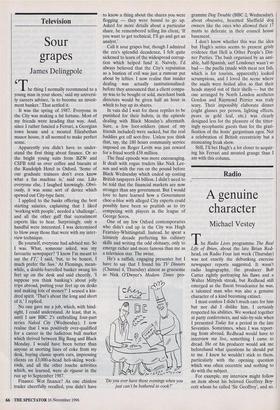Television
Sour grapes
James Delingpole
'The thing I normally recommend to a young man in your shoes,' said my universi- ty careers adviser, 'is to become an invest- ment banker.' That settled it.
It was the spring of 1987. Everyone in the City was making a fat fortune. Most of my friends were heading that way. And, since I rather fancied a Ferrari, a Georgian town house and a moated Elizabethan manor house, it all seemed to make perfect sense.
Apparently you didn't have to under- stand the first thing about fmance. Or so the bright young suits from BZW and CSFB told us over coffee and biscuits at the Randolph Hotel in Oxford. 'Some of our graduate trainees don't even know what a fax machine is,' said one. Like everyone else, I laughed knowingly. Obvi- ously, it was some sort of device which spewed out City-type facts.
I applied to the banks offering the best starting salaries, explaining that I liked `working with people', needed a 'challenge', and all the other guff that recruitment experts like to hear. Surprisingly, only a handful were interested. I was determined to blow away those that were with my inter- view technique.
Be yourself, everyone had advised me. So I was. What, someone asked, was my favourite newspaper? 'I know I'm meant to say the FT,' I said, 'but, to be honest, I much prefer the Sun.' At Flemings, mean- while, a double-barrelled banker swung his feet up on the desk and said cheerily, 'I suppose you think banking's about jolly trips abroad, putting your feet up on desks and making lots of money?' I sensed a kin- dred spirit. 'That's about the long and short of it,' I replied.
No one gave me a job, which, with hind- sight, I could understand. At least, that is, until I saw BBC 2's enthralling four-part series Naked City (Wednesday). I now realise that I was positively over-qualified for a career in the ludicrous bull market which thrived between Big Bang and Black Monday. I would have been better than anyone at snorting lines of coke from my desk, buying classic sports cars, impressing clients on £3,000-a-head heli-skiing week- ends, and all the other louche activities which, we learned, were de rigueur in the run up to September 1987.
Finance. Wot finance? As one chinless trader cheerfully recalled, you didn't have to know a thing about the shares you were flogging — they were bound to go up. Asked for more details about a particular share, he remembered telling his client, 'If you want to get technical, I'll go and get an analyst.'
Call it sour grapes but, though I admired the era's splendid decadence, I felt quite sickened to learn of the widespread corrup- tion which helped fund it. Naively, I'd always believed that the City's reputation as a bastion of evil was just a rumour put about by lefties. I now realise that insider dealing was actually institutionalised: before they announced that a client compa- ny was to be bought or sold, merchant bank directors would be given half an hour in which to buy up its shares.
In vain did I wait for these reptiles to be punished for their hubris, in the episode dealing with Black Monday's aftermath. Sure, a few foot-soldiers (most of my friends included) were sacked, but the real baddies got off scot-free. Unless you think that, say, the 180 hours community service imposed on Roger Levitt was just reward for a fraud worth £58 million.
The final episode was more encouraging. It dealt with rogue traders like Nick Lee- son and with the run on the pound before Black Wednesday which ended up costing British taxpayers £4 billion. I didn't need to be told that the financial markets are now stronger than any government. But I would love to have learned how a Government choc-a-bloc with alleged City experts could possibly have been so prattish as to try competing with players in the league of George Soros.
One of my few Oxford contemporaries who didn't end up in the City was Hugh Fearnley-Whittingstall. Instead, he spent a leisurely decade perfecting his culinary skills and writing the odd obituary, only to emerge richer and more famous than me as a television star. The swine.
He's a raffish, engaging presenter but I have to say that I found his TV Dinners (Channel 4, Thursday) almost as gruesome as Nick O'Dwyer's Modern Times pro- `Do you ever have those evenings when you just can't be bothered to cook?' gramme Dog Trouble (BBC 2, Wednesday), about obsessive, besotted Sheffield dog owners like the ones who allowed their 17 mutts to defecate in their council house basement.
I don't know whether this was the idea but Hugh's series seems to present grisly evidence that Hell is Other People's Din- ner Parties. The bash organised by an ami- able, half-Spanish, sail Londoner wasn't so bad — the paella (made with meat not fish, which is for tourists, apparently) looked scrumptious, and I loved the scene where the snails were boiled alive so that their heads stayed out of their shells — but the one arranged by North London aesthetes Gordon and Raymond Perrier was truly scary. Their impossibly elaborate dinner (eight glasses per person, lighting effects, pears in gold leaf, etc.) was clearly designed less for the pleasure of the titter- ingly sycophantic guests than for the grati- fication of the hosts' gargantuan egos. Not a celebration of British eccentricity but a nauseating freak show.
Still, I'll bet Hugh's a lot closer to acquir- ing his Ferrari and moated grange than I am with this column.


















































































 Previous page
Previous page